by [email protected] | May 1, 2024 | Elevating Practice Owner Confidence
Podcast: Play in new window | Download
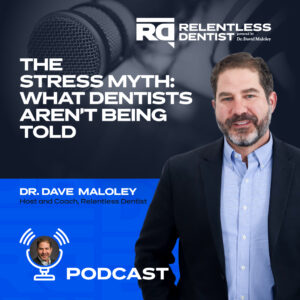 Do you ever feel overwhelmed by the pressure of running a dental practice?
Do you ever feel overwhelmed by the pressure of running a dental practice?
Think stress is just a roadblock to your success? Think again!
What if that stress could actually be your greatest asset?
Discover how redefining stress can turbocharge your productivity, enhance your learning, and fortify your health:
- Unlock the True Power of Stress: Learn how stress, when approached with the right mindset, can become a powerful ally in your practice. Dive into the pioneering work of Stanford’s Dr. Kelly McGonigal and Dr. Alia Crum to transform your perspective.
- Mindset Makeover: Explore actionable strategies to shift your view of stress from a threat to a growth opportunity, boosting resilience and sparking innovation in your dental practice.
- Harness Stress for Peak Performance: Uncover how embracing stress signals your deep commitment to your goals and can be leveraged to achieve remarkable success and satisfaction.
Ready to turn the inherent stress in your dental practice into a powerhouse of growth and achievement? Listen now to start transforming your stress into your most potent tool for success!
Are you ready to upgrade your practice? Need help implementing the Dentists Ascend Method? Don’t miss Dr. Dave’s presentation: ‘How to Build a Referral-Centric, High-Profit Dental Practice Without the Team Drama — Even if You’re Currently Overwhelmed.‘ This resource is tailored to help you enhance your operations, boost patient referrals, and increase profits while creating a self-managing team. Perfect for any dental practice owner looking to win in today’s challenging environment. Check it out now!
Key Quotes:
- “When dental practice owners view stress in this light [stress is enhancing], they often experience improved problem-solving skills, increased motivation, and a greater sense of accomplishment.”
- “Embracing stress in this way empowers owners to navigate challenges with confidence and creativity, ultimately leading to better outcomes for themselves and their practices.”
- “Stress improves performance by temporarily increasing that energy and focus, especially in challenging situations where immediate action is required.”
- “Recognizing that stress is a sign of commitment and passion is far better than succumbing to whatever indifference and disengagement that seems all too common in the world today.”
- “Instead of expending energy trying to eliminate stress, use the natural stress response to your advantage… By viewing stress as a resource, you can turn challenging situations into opportunities for growth and achievement.”
Featured on the Show:
- People: Kelly McGonigal, is a renowned health psychologist, educator, and author known for her transformational work on stress, willpower, and movement. McGonigal’s books, including “The Upside of Stress” and “The Joy of Movement”, expertly weave science with relatable stories, empowering readers to understand themselves better and tap into the transformative power of the human spirit.
- People: Alia Crum, is an Associate Professor of Psychology at Stanford University and the Principal Investigator of the Stanford Mind & Body Lab. Her groundbreaking research reveals the profound impact of mindsets on our health, behavior, and performance. Dr. Crum’s work aims to harness the power of mindsets to drive positive change and unlock human potential.
- Book: The Upside of Stress: Why Stress Is Good for You, and How to Get Good at It, Kelly McGonigal
- I appreciate your feedback. Let me know what you learned and loved here: [email protected].


by [email protected] | Apr 24, 2024 | Enjoying Cash Flow
Podcast: Play in new window | Download
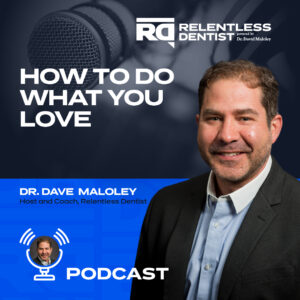 Feeling stuck in a rut with your dental practice? Discover strategies to inject excitement and purpose back into your daily routine.
Feeling stuck in a rut with your dental practice? Discover strategies to inject excitement and purpose back into your daily routine.
Join Dr. Dave as he draws on insights from renowned entrepreneur Paul Graham’s essay, ‘How to Do What You Love.’ Learn how reigniting passion can dramatically improve your dental office.
This episode offers practical advice on revitalizing your practice, enhancing team dynamics, improving patient care, and boosting profitability—all through creativity and joy.
We’ll also examine the cultural reasons behind our dread of work and offer actionable steps to overcome this negative mindset.
- Rethink Work Culture: How can addressing our beliefs about work lead to better financial and personal outcomes?
- Enhance Team Dynamics: Is a fun and engaging work environment the key to boosting productivity?
- Superior Patient Care: Discover how a happier team can provide unparalleled care and generate more word-of-mouth referrals.
Don’t resign yourself to lackluster workdays. Listen now and start revitalizing your practice into a more enjoyable and profitable endeavor!
Are you ready to upgrade your practice? Need help implementing the Dentists Ascend Method? Don’t miss Dr. Dave’s presentation: ‘How to Build a Referral-Centric, High-Profit Dental Practice Without the Team Drama — Even if You’re Currently Overwhelmed.‘ This resource is tailored to help you enhance your operations, boost patient referrals, and increase profits while creating a self-managing team. Perfect for any dental practice owner looking to win in today’s challenging environment. Check it out now!
Key Quotes:
- “In the world of dentistry, where the precision of your practice intertwines with the satisfaction of your patients, loving what you do is not just a matter of personal fulfillment. It’s a real cornerstone of long-term success and financial prosperity.”
- “A practice led by passion rather than obligation is more likely to attract and retain both patients and the most talented team, fostering a thriving business environment.”
- “Encouraging your team to discover joy in their work, whether through continuous education, patient interactions, or community involvement, can redefine their professional lives and lift the entire practice to a new level.”
- “It’s essential for dental practice owners to look beyond the financial gains and the societal recognition that we receive when we’re defining our professional path.”
- “This mantra is vital for dental practice owners who must continually evolve to stay relevant in a rapidly changing field. Keep moving. Don’t get complacent.”
Featured on the Show:
- People: Paul Graham, is an English-born computer scientist, entrepreneur, and essayist. He is known for his work on the Lisp programming language and for co-founding Y Combinator, the influential startup accelerator that launched companies like Dropbox, Airbnb, and Reddit.
- People: David Senra, hosts The Founders Podcast, dissecting the lives of influential entrepreneurs to share actionable lessons. He emphasizes the value of learning from history’s business leaders, innovators, and strategists.
- Essay: How To Do What You Love, Paul Graham
- Blog: The Key to Motivating Your Dental Employees, Relentless Dentist Podcast
- I appreciate your feedback. Let me know what you learned and loved here: [email protected].


by [email protected] | Apr 17, 2024 | Enthusing Clients
Podcast: Play in new window | Download
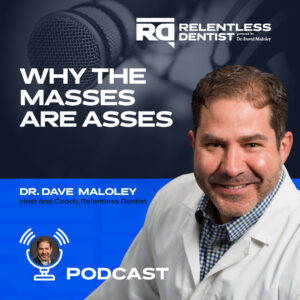 Stand Out, Earn More! Join Dr. Dave in this enlightening episode as we dive into the crucial role of uniqueness in elevating dental practices.
Stand Out, Earn More! Join Dr. Dave in this enlightening episode as we dive into the crucial role of uniqueness in elevating dental practices.
Inspired by Mark Twain’s wisdom, “Whenever you find yourself on the side of the majority, it is time to pause and reflect,” we invite you to reflect on how to make your dental practice uniquely successful.
- Discover the Five Levels: Unpack the ‘Five Levels of Dentist Distinction’ and learn how each level can profoundly enhance the value you offer to your patients.
- Brand Identity Insights: Gain crucial insights into crafting a unique brand identity that shapes patient perceptions and elevates your services’ value.
- Patient-Centric Strategies: Explore actionable strategies for aligning your practice with the needs of the patients you are most passionate about helping.
Differentiation isn’t just beneficial; it’s essential. This episode provides you with the knowledge and tools to create a standout dental practice that attracts and retains patients willing to pay premium fees for distinguished services.
Transform your dental practice into a beacon of uniqueness and quality. Click to listen and start your journey to a more successful practice today.
Take the next step towards transforming your dental practice. Take Dr. Dave’s Dentists Ascend Quiz to discover the hidden potential in your business.
Key Quotes:
- “Different is better than better. Different doesn’t try to turn you into something else. Different allows you to highlight the singular traits you already have within you, in this case, within your practice.”
- “By clearly establishing a unique brand identity, you tell potential patients exactly what they can expect in terms of care, expertise, experience.”
- “Practices with a strong, distinct brand can create higher demand for those services as patients associate them with a specific value proposition that is not readily available elsewhere in the area.”
- “Insurance involvement here becomes more strategic. Practices may offer services that exceed the standard insurance coverage to provide exceptional care. Thus patients pay more out of pocket, seeing the value in a heightened level of attention and service.”
- “Money is attracted to a unique value. So today, as we progress from level one to level five, in our distinction strategies, we saw a transition from undifferentiated practices to becoming highly differentiated.”
Featured on the Show:
- People: Sally Hogshead, a New York Times bestselling author, celebrated speaker, and CEO of How to Fascinate, is renowned for her insights on branding. Her book, “How the World Sees You: Discover Your Highest Value Through the Science of Fascination,” offers valuable guidance on creating a distinct and compelling brand identity.
- People: Seth Godin, is a renowned entrepreneur, speaker, and bestselling author. He’s launched a popular blog and written 21 bestselling books, including The Dip, Linchpin, Purple Cow, Tribes, This is Marketing, The Song of Significance, and The Practice.
- I appreciate your feedback. Let me know what you learned and loved here: [email protected].


by [email protected] | Apr 10, 2024 | Enhancing Culture
Podcast: Play in new window | Download
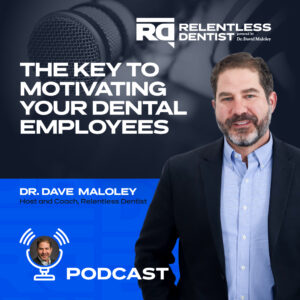 Are you still managing your dental practice with century-old methods inspired by Henry Ford? This week, Dr. Dave highlights the transformative power of autonomy and its potential to revolutionize your team dynamics. Tune in to discover why embracing these modern management techniques not only boosts morale but also drives innovation and productivity in your practice.
Are you still managing your dental practice with century-old methods inspired by Henry Ford? This week, Dr. Dave highlights the transformative power of autonomy and its potential to revolutionize your team dynamics. Tune in to discover why embracing these modern management techniques not only boosts morale but also drives innovation and productivity in your practice.
In this episode, you’ll discover:
- The Autonomy Edge: Learn how moving beyond rigid management significantly increases engagement and satisfaction within your dental practice.
- Steps to Empowerment: Follow our guided steps to create a self-managing team that excels in collaboration and independence.
- Concepts in Practice: Explore applications of autonomy and how these principles could be realized within your dental practice to foster a more motivated and collaborative environment.
Is it time to modernize your management style and let your team flourish with more independence? Listen now as we delve into the best way to lead your practice into a future where every team member is empowered and motivated.
Take the next step towards transforming your dental practice. Take Dr. Dave’s Dentists Ascend Quiz to discover the hidden potential in your business.
Key Quotes:
- “Embracing autonomy in dental practices offers tremendous potential, drastically reducing team turnover and enhancing collaboration. When team members are given the freedom to make decisions and shape their roles, they develop a deeper connection to their work and a stronger commitment to your practice.”
- “Autonomy in a dental practice means allowing team members the freedom to make decisions about how they carry out their tasks day to day without strict supervision. This empowers them to use their expertise to improve their own performance and enhance the overall patient experience.”
- “Empowering decision-making means giving team members the authority to make choices and take actions in their areas of responsibility. I often refer to that as own your zone.”
- “There will be frustrations, but that will be the raw material for innovation and growth.”
- “When you hear autonomy, please don’t think free for all. Each team member needs to grow and become self-managing. If they can’t do that, they belong on somebody else’s team.”
Featured on the Show:
- People: Richard M. Ryan, a clinical psychologist, is a distinguished professor at the Australian Catholic University and the University of Rochester. He co-developed Self-Determination Theory (SDT) with Edward L. Deci, contributing significantly to the understanding of human motivation, psychological development, and wellness.
- People: Edward L. Deci, is a professor of Psychology at the University of Rochester and director of its Human Motivation Program. He is renowned for his research on intrinsic and extrinsic motivation and basic psychological needs, as well as for co-founding self-determination theory (SDT) with Richard Ryan.
- People: Barry Schwartz, is a renowned psychologist recognized for his exploration of human motivation and the societal influences on behavior. His critical examination of work ethic, decision-making dilemmas, and institutional impacts culminates in his book “Why We Work,” where he argues for a work culture that prioritizes meaning and purpose over monetary gain.
- People: Henry Ford, revolutionized the automobile industry with the moving assembly line, enhancing production efficiency and making cars like the Model T affordable for many. His method transformed manufacturing globally.
- I appreciate your feedback. Let me know what you learned and loved here: [email protected].


by [email protected] | Apr 3, 2024 | Elevating Practice Owner Confidence
Podcast: Play in new window | Download
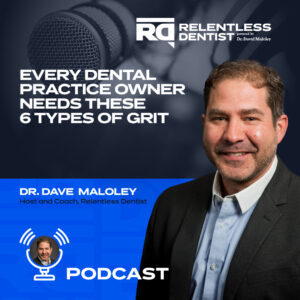 Are you leveraging any of the six types of grit to guide your dental practice to success? Grit isn’t just a nice to have; it’s crucial for flourishing in the demanding world of dentistry. With the right grit, you steer through challenges with ease and uncover opportunities others miss. Let’s unravel the essence of grit and how to foster each type for undeniable success.
Are you leveraging any of the six types of grit to guide your dental practice to success? Grit isn’t just a nice to have; it’s crucial for flourishing in the demanding world of dentistry. With the right grit, you steer through challenges with ease and uncover opportunities others miss. Let’s unravel the essence of grit and how to foster each type for undeniable success.
Discover the transformative power of grit in this powerful episode. Dr. Dave guides dental practice owners through the six key types of grit, showing how they’re essential for overcoming industry hurdles and boosting both personal and professional growth.
- Grit Defined: Uncover how passion and perseverance merge to form grit, the bedrock of success.
- Six Grit Types: Explore the roles these play in fostering resilience and confidence amid dental practice challenges.
- Grit in Action: Learn practical strategies to develop grit, enhancing your practice and self-assurance.
Empower yourself with the knowledge to build a resilient, confident approach to your dental practice. This episode is your shortcut to becoming a more effective, inspired leader. Tune in now!
Take the next step towards transforming your dental practice. Take Dr. Dave’s Dentists Ascend Quiz to discover the hidden potential in your business.
Key Quotes:
- “The dentist must lead themselves. That’s what we refer to as ‘elevate confidence’. Then we take that confidence and we can infuse it in our team and we lead that group of employees.”
- “Neglecting to embrace all six types of grit will have significant consequences for your operation. Without the resilience to persevere through challenges… your practice will struggle to adapt and grow in a competitive industry.”
- “Dental practice owners who recognize and cultivate these six types of grit don’t waste time fretting about inevitable business challenges or feeling sorry for themselves.”
- “Grit combines a profound passion with perseverance towards achieving long-term goals… deeply rooted in the prefrontal cortex… crucial for planning, decision making, and maintaining focus on complex objectives.”
- “Individuals with high levels of grit find significant fulfillment in the effort that they invest, not just in achieving the goals themselves… the true reward is found overcoming challenges and growing from the experience.”
Featured on the Show:
- People: Michael Jordan, often considered the greatest basketball player of all time, transcended sports during a storied career primarily with the Chicago Bulls in the NBA.
- People: Indra Nooyi, is a highly respected business executive known for her leadership as the former CEO of PepsiCo.
- People: Mahatma Gandhi, was an Indian lawyer, anti-colonial nationalist, and political ethicist who employed nonviolent resistance to lead the successful campaign for India’s independence from British rule.
- I appreciate your feedback. Let me know what you learned and loved here: [email protected].


by [email protected] | Mar 27, 2024 | Elevating Practice Owner Confidence
Podcast: Play in new window | Download
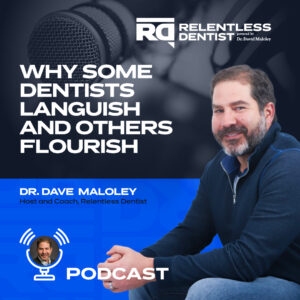 Are you tired of feeling drained, overwhelmed, and unfulfilled in your dental practice?
Are you tired of feeling drained, overwhelmed, and unfulfilled in your dental practice?
Imagine a dental practice that isn’t a constant source of stress, but a place of genuine fulfillment. This vision is achievable thanks to positive psychology! The Relentless Dentist Podcast will help you transform your dental practice into a vibrant hub of well-being for yourself, your team, and your patients.
It’s time to break free from the shackles of frustration and exhaustion. Join Dr. Dave on this episode as he unveils the antidote to your professional woes.
* Dive into the depths of exhaustion, overwhelm, and dissatisfaction plaguing dental practitioners.
* Discover the transformative power of positive psychology in revitalizing your practice and reigniting your passion.
* Learn how the PERMA model offers a roadmap to freedom, guiding you toward fulfillment and success.
Ready to reclaim your joy and reignite your passion for dental practice ownership? Tune in now and embark on a journey towards a more prosperous dental practice!
Take the next step towards transforming your dental practice. Take Dr. Dave’s Dentists Ascend Quiz to discover the hidden potential in your business.
Key Quotes:
- “Dentistry isn’t easy. Being an employer isn’t easy. Running a business certainly isn’t easy. But what happens when you try and do all three simultaneously and to a high standard? Oftentimes, that means your well-being is sacrificed.”
- “As a dental practice owner, languishing presents a multifaceted challenge that can permeate all aspects of life… This emotional drain not only affects your own well-being but also reverberates through the dynamics of your dental team, creating an atmosphere of disillusionment and diminished morale.”
- “When we’re truly engaged in our work, we often experience a state of flow… that state of higher consciousness known as flow not only enhances our effectiveness but brings us a profound sense of fulfillment and satisfaction as practice leaders.”
- “Finding meaning in dentistry goes beyond just fixing teeth… It’s about making a meaningful difference in the lives of our patients and our communities. Meaning is about belonging to something bigger and contributing to a greater cause.
- “As dentists, a sense of accomplishment comes from setting and pursuing goals that challenge us to grow and excel… Our pursuit of external rewards such as wealth and prosperity should be matched with striving for growth and connection.”
Featured on the Show:
- People: Dr. Martin E.P. Seligman, is an esteemed psychologist, educator, and author widely considered the founder of positive psychology, a movement focused on human strengths, well-being, and flourishing. He developed the PERMA model, which outlines the key elements of well-being: Positive emotions, Engagement, Relationships, Meaning, and Accomplishment.
- People: Abraham Maslow, was an American psychologist known for his influential Hierarchy of Needs theory, which emphasizes human potential and the drive for self-actualization.
- Organization: American Psychological Association (APA), is the leading scientific and professional organization for psychologists in the United States.
- Podcast: Autopilot Alert: The Hidden Consequences of Mindlessness in Dentistry, The Relentless Dentist Podcast by Dr. Dave Maloley
- I appreciate your feedback. Let me know what you learned and loved here: [email protected].


by [email protected] | Mar 20, 2024 | Enjoying Cash Flow
Podcast: Play in new window | Download
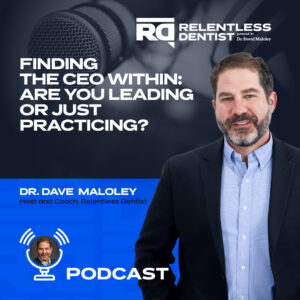 Do you feel the weight of your dental practice on your shoulders despite your dedication? Are you ready to transcend traditional practice management and build the practice of your dreams?
Do you feel the weight of your dental practice on your shoulders despite your dedication? Are you ready to transcend traditional practice management and build the practice of your dreams?
Let’s delve into the world of leadership and high performance for dental practice owners. Learn the essential skills and strategies of a confident Dental CEO, from visionary leadership and financial acumen to team development and optimized patient experiences.
In this episode, Dr. Dave delves into a pressing issue faced by many dentists: the struggle to unlock the full potential of their practice despite their exceptional clinical skills.
- Leadership Beyond the Chair: Explore the critical role of leadership and vision in running a successful dental practice.
- The Cost of Avoidance: Discover the repercussions of lacking a dedicated CEO, from inconsistency to a lack of strategic direction.
- The Danger of Delegation: Uncover why delegating CEO responsibilities leads to confusion and hinders the practice’s growth.
Ready to take your dental practice to new heights?
Embrace the role of a confident CEO by focusing on The Seven Imperatives! Tune in to learn how to lead your practice to greatness.
Take the next step towards transforming your dental practice. Take Dr. Dave’s Dentists Ascend Quiz to discover the hidden potential in your business.
Key Quotes:
- “Your clinical skills are the foundation of your practice. It’s the reason your patients walk through the door. But it’s your leadership, your ability to see beyond that day-to-day, to inspire and guide your team, to strategize and dream that will elevate your practice to greatness.”
- “Embracing that CEO role with empathy and understanding for the challenges you face is not just an option, it’s really a necessity for those looking to transcend the limits of traditional practice management and truly win long-term.”
- “A confident CEO must have a clear, compelling vision for the practice that goes beyond day-to-day operations. This vision should encapsulate where the practice is headed, what type of care it aims to provide, and how it seeks to innovate and lead in the dental industry at least within the community.”
- “Understanding the financial health of the practice is paramount. This includes budgeting, forecasting, analyzing financial statements, and making informed decisions about investments, pricing strategies, and cost management.”
- “The dental industry is rapidly evolving, and any sort of successful CEO is going to stay ahead of the curve through continuous learning and innovation.”
Featured on the Show:
- I appreciate your feedback. Let me know what you learned and loved here: [email protected].


by [email protected] | Mar 13, 2024 | Enthusing Clients
Podcast: Play in new window | Download
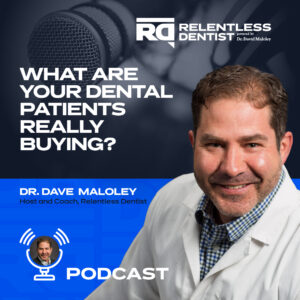 Are you speaking a dental language your patients don’t understand?
Are you speaking a dental language your patients don’t understand?
Even the most technical dentist can miss the mark if they’re not connecting with patients on an emotional level. This episode of the Relentless Dentist Podcast dives into the surprising truth: patients aren’t as interested in the technical details as they are in the results.
Today, Dr. Dave delves into the common disconnect between dentists’ clinical precision and patients’ quest for emotional fulfillment. This enlightening episode guides dental practice owners towards fostering deeper, more meaningful patient relationships, promising a transformative shift in practice approach.
Discover How To:
- Unlock Emotional Insights: Dive into the true motivations behind patient visits. Learn how understanding these emotional drivers can significantly boost treatment acceptance.
- Evolve Your Communication: Adapt your practice’s messaging to align with contemporary patient expectations, distinguishing your services in a competitive landscape.
- Implement Success Strategies: Gain mastery over presenting treatment options by emphasizing their emotional benefits, directly resonating with patient needs.
Elevate your dental practice by enhancing patient connections and increasing case acceptance. Step into a new era of patient-centered care that prioritizes patient motivations alongside clinical excellence.
Listen now to embark on your journey to a more empathetic, patient-focused approach in dentistry.
Take the next step towards transforming your dental practice. Take Dr. Dave’s Dentists Ascend Quiz to discover the hidden potential in your business.
Key Quotes:
- “Our well-intentioned, intellectual dentist brain loves to present logical, feature-rich arguments focusing on the technical excellence of our services, yet our patients, driven by emotional and sometimes irrational motivations, are looking for something entirely different.”
- “In the busy day-to-day of a dental practice, one pivotal question often goes unanswered. What is the result or solution your patient is truly seeking, and what relief do they gain from it?”
- “Stop selling logic. Instead, offer results, solutions, and relief. This mantra should become the cornerstone of how we communicate with our patients.”
- “Consumers are transforming faster than we are, and if we don’t catch up, we are in trouble.”
- “By understanding and addressing the diverse motivations of your patients, you position your practice not just as a provider of dental services, which kind of lumps you into a commodity, but as a partner in achieving their personal health and wellness goals.”
Featured on the Show:
- People: Ian Schafer, is the founder and former CEO of Deep Focus, a digital marketing agency known for innovative campaigns and creative storytelling.
- I appreciate your feedback. Let me know what you learned and loved here: [email protected].


by [email protected] | Mar 6, 2024 | Enhancing Culture
Podcast: Play in new window | Download
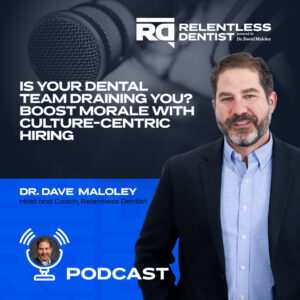 Have you ever questioned if everyone on your dental team truly fits the culture of your practice? Dr. Dave shares insights from his own experiences and those of other dentists, focusing on the critical role of hiring for culture fit. Find out how aligning your team with your practice’s core values and vision can transform your workplace into a cohesive, thriving environment where everyone looks forward to contributing their best.
Have you ever questioned if everyone on your dental team truly fits the culture of your practice? Dr. Dave shares insights from his own experiences and those of other dentists, focusing on the critical role of hiring for culture fit. Find out how aligning your team with your practice’s core values and vision can transform your workplace into a cohesive, thriving environment where everyone looks forward to contributing their best.
It’s important that you enjoy the people you employ.
In this episode, Dr. Dave explores the essence of culture-centric hiring within dental practices. With a blend of personal stories and seasoned advice, he guides us through the journey of creating a team that not only achieves professional excellence but also fosters a joyful and supportive atmosphere.
Discover the strategies to mold a practice where each member is passionately aligned with a unified vision of success.
- Define and Align: Learn to vividly articulate your practice’s culture, drawing in individuals who not only share your core values and mission but are eager to contribute to them.
- Beyond the Resume: Delve into the effectiveness of behavioral interviewing techniques to uncover candidates’ true spirits, ensuring a match that extends well beyond mere technical abilities.
- Team-Driven Hiring: Uncover the benefits of including your existing team in the hiring process, promoting a more integrated and harmonious workplace culture.
Tune in and revolutionize your hiring approach to assemble the ideal team that elevates your dental practice to unparalleled levels of harmony and success.
Take the next step towards transforming your dental practice. Take Dr. Dave’s Dentists Ascend Quiz to discover the hidden potential in your business.
Key Quotes:
- “Listen, you spend a tremendous amount of your life with your dental team, so you must prioritize culture and attitude above all else. And it’s not just about enhancing the bottom line. As Peter Drucker famously said, culture eats strategy for breakfast.”
- “Imagine having a team of humble, hungry professionals who are fully aligned with your mission. It will transform your practice and your life.”
- “The very first thing that we need to look at when it comes to culture-centric hiring is defining your culture clearly. Start by articulating the essence of your practice’s culture. This involves deep introspection.”
- “When I had our culture locked and loaded, the team met with the candidate first. If they liked that candidate, then I would interview them almost as a formality. I always hired them. I wanted to make sure that I was in a relationship with them, and that they understood our mission and values. But ultimately, the team did the hiring and said, I want this person on our team. That made them immediately invested in their success.”
- “The ability to communicate effectively is crucial in a setting where collaboration and patient care are daily priorities. A team member’s ability to articulate their thoughts clearly, listen actively, and adapt communication styles depending on the situation can significantly impact team harmony and patient satisfaction.”
Featured on the Show:
- People: Peter Drucker, was a prolific writer and consultant whose insights on management, leadership, and organizational structure profoundly shaped the modern business world. He is known as the “father of modern management”.
- People: Jeff Bezos, is a visionary entrepreneur who revolutionized e-commerce and cloud computing by founding Amazon.
- I appreciate your feedback. Let me know what you learned and loved here: [email protected].


by [email protected] | Feb 28, 2024 | Elevating Practice Owner Confidence
Podcast: Play in new window | Download
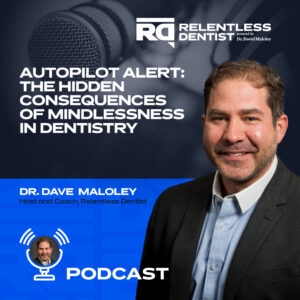 Is there a silent thief sabotaging your dental practice’s success? It might be a surprising culprit – mindlessness.
Is there a silent thief sabotaging your dental practice’s success? It might be a surprising culprit – mindlessness.
Mindlessness hurts your practice. It compromises patient care, decision-making, and your well-being. But mindfulness is a powerful tool! I’ll show you simple ways to integrate it and reap the benefits.
Uncover the overlooked dangers of “autopilot mode” in dentistry and its silent yet profound impact on your practice. In this revealing episode, Dr. Dave ventures deep into the hidden aspects of routine dental care, spotlighting how mindlessness can undermine a dental practice owner’s confidence and the core of their practice.
- The Cost of Autopilot: Explore the detrimental effects of mindlessness on decision-making, team dynamics, and overall practice efficiency.
- The Power of Mindfulness: Discover how mindfulness can transform your practice by sharpening focus, alleviating stress, and fostering a culture of empathy and teamwork.
- Mindfulness in Action: Unveil practical strategies to weave mindfulness into your daily routine, significantly boosting resilience, patient satisfaction, and care quality.
Tune in now for a transformative journey and unlock the secret to a more focused, stress-free, and fulfilling dental career through the power of mindfulness.
Take the next step towards transforming your dental practice. Take Dr. Dave’s Dentists Ascend Quiz to discover the hidden potential in your business.
Key Quotes:
- ”Mindlessness is pervasive. In fact, I believe virtually all of our problems, personal, interpersonal, professional, and societal, either directly or indirectly, stem from mindlessness.”
- “Mindfulness … offers profound benefits that are particularly relevant in the high-pressure environment of dentistry.”
- “Mindfulness significantly reduces stress and anxiety… crucial in managing the inherent pressures that come with owning a dental practice.”
- “Engage in active listening with your patients and staff… This practice not only improves communication but also fosters a deeper connection and trust along with the mindfulness benefits.”
- “Imagine that mindfulness is a muscle… Each time you pause… you’re fortifying your ability to remain present and fully engaged in the moment.”
Featured on the Show:


 Do you ever feel overwhelmed by the pressure of running a dental practice?
Do you ever feel overwhelmed by the pressure of running a dental practice?


 Feeling stuck in a rut with your dental practice? Discover strategies to inject excitement and purpose back into your daily routine.
Feeling stuck in a rut with your dental practice? Discover strategies to inject excitement and purpose back into your daily routine. Stand Out, Earn More! Join Dr. Dave in this enlightening episode as we dive into the crucial role of uniqueness in elevating dental practices.
Stand Out, Earn More! Join Dr. Dave in this enlightening episode as we dive into the crucial role of uniqueness in elevating dental practices. Are you still managing your dental practice with century-old methods inspired by Henry Ford? This week, Dr. Dave highlights the transformative power of autonomy and its potential to revolutionize your team dynamics. Tune in to discover why embracing these modern management techniques not only boosts morale but also drives innovation and productivity in your practice.
Are you still managing your dental practice with century-old methods inspired by Henry Ford? This week, Dr. Dave highlights the transformative power of autonomy and its potential to revolutionize your team dynamics. Tune in to discover why embracing these modern management techniques not only boosts morale but also drives innovation and productivity in your practice. Are you leveraging any of the six types of grit to guide your dental practice to success? Grit isn’t just a nice to have; it’s crucial for flourishing in the demanding world of dentistry. With the right grit, you steer through challenges with ease and uncover opportunities others miss. Let’s unravel the essence of grit and how to foster each type for undeniable success.
Are you leveraging any of the six types of grit to guide your dental practice to success? Grit isn’t just a nice to have; it’s crucial for flourishing in the demanding world of dentistry. With the right grit, you steer through challenges with ease and uncover opportunities others miss. Let’s unravel the essence of grit and how to foster each type for undeniable success. Are you tired of feeling drained, overwhelmed, and unfulfilled in your dental practice?
Are you tired of feeling drained, overwhelmed, and unfulfilled in your dental practice? Do you feel the weight of your dental practice on your shoulders despite your dedication? Are you ready to transcend traditional practice management and build the practice of your dreams?
Do you feel the weight of your dental practice on your shoulders despite your dedication? Are you ready to transcend traditional practice management and build the practice of your dreams? Are you speaking a dental language your patients don’t understand?
Are you speaking a dental language your patients don’t understand? Have you ever questioned if everyone on your dental team truly fits the culture of your practice? Dr. Dave shares insights from his own experiences and those of other dentists, focusing on the critical role of hiring for culture fit. Find out how aligning your team with your practice’s core values and vision can transform your workplace into a cohesive, thriving environment where everyone looks forward to contributing their best.
Have you ever questioned if everyone on your dental team truly fits the culture of your practice? Dr. Dave shares insights from his own experiences and those of other dentists, focusing on the critical role of hiring for culture fit. Find out how aligning your team with your practice’s core values and vision can transform your workplace into a cohesive, thriving environment where everyone looks forward to contributing their best. Is there a silent thief sabotaging your dental practice’s success? It might be a surprising culprit – mindlessness.
Is there a silent thief sabotaging your dental practice’s success? It might be a surprising culprit – mindlessness.